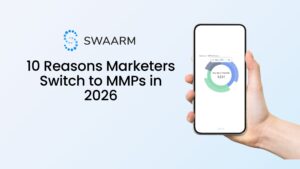Before we dive into the topic of mobile measurement partners, it is crucial to bear in mind that, in our modern era, mobile phones have become an integral part of everyone’s day-to-day life. Once upon a time, they existed just to make calls and send texts. But today, they have evolved into our indispensable companions, so much so that life would be unimaginable without them. All this is to say, cell phones aren’t just a trend – they’re a lifestyle.
Indeed, statistics reveal a fascinating reality behind our contemporary digital outlook, too. Nowadays, the average mobile user checks their device an astonishing 256 times a day. This astounding frequency illustrates the profound significance of these gadgets in the way we all live today. Put succinctly, they’re more than just tools. They’ve become extensions of ourselves, seamlessly woven into our everyday routines.
As such, it’s no surprise that the number of mobile apps in the app stores continues to proliferate. In 2022, phone users downloaded a record 255 mobile billion apps. For businesses and brands, maintaining a presence in app stores is a way for them to both engage their existing customers and reach new ones identified in their target audience. And to achieve the best results, mobile measurement partners are indispensable.
In this blog, we will guide you through everything you need to know about mobile measurement partners. It will cover their vital role in the mobile advertising industry, as well as delve into the technical details of how they operate.
What are mobile measurement partners?
Photo by Gilles Lambert on Unsplash
For any advertiser wanting to succeed in mobile marketing, mobile measurement partners (MMPs) are essential. In a nutshell, MMPs are responsible for managing and safeguarding the valuable data that enables apps to accurately track and optimize their ad campaigns, mobile app performance, and user engagement. They are, if you like, “data custodians” that help businesses navigate through the complexities of mobile marketing.
Or, to put it in even simpler terms, companies use mobile measurement partners to gain insight into the performance of their app advertising campaigns.
As such, these partners can provide a range of services to help monitor a brand’s entire user experience within mobile apps. From the moment a user clicks on an ad through to the end goal, whether that’s a purchase, sign–up, or some other desirable action, MMPs track and analyze every part of the journey. Employing sophisticated techniques to attribute user actions to specific marketing touchpoints, they offer businesses a clear understanding of which advertising strategies are working best. With this detailed information, their clients can make informed decisions about how to optimize their advertising campaigns and achieve even greater success.
How do MMPs work?
Photo by Rami Al-zayat on Unsplash
Mobile measurement partners (MMPs) are the analytical brains behind mobile marketing campaigns.
They employ sophisticated and precise mechanisms to unravel the intricacies of user interactions within mobile apps. Here’s a detailed look at how MMPs work:
Technical aspects
MMPs utilize a combination of software development kits (SDKs), application programming Interfaces (APIs), and tracking pixels to capture and interpret user actions. When a user engages with a mobile ad, the MMP’s SDK embedded within the app springs into action, recording essential data points. This data includes the ad source, user device information, timestamp, and the specific action taken, such as an app installation, purchase, or registration.
Event tracking
One core function of MMPs is event tracking, whereby they monitor and record user interactions within mobile apps. Event tracking can range from the initial ad click that led the user to the app installation to subsequent in–app actions like product views, adding items to the cart, or completing a transaction. The granularity of event tracking allows businesses to gain invaluable insights into user behavior, identify engagement bottlenecks, and refine their user experiences.
Attribution models unveiled
MMPs employ attribution models to attribute ad–driven actions to specific marketing touchpoints. Common attribution models include last–click attribution, multi–touch attribution, and probabilistic attribution. These models offer varying degrees of sophistication in determining which ad or marketing channel deserves credit for a user’s action. Accurate attribution empowers businesses to assess the effectiveness of different marketing efforts and allocate budgets strategically.
Key features and capabilities of an MMP
Photo by Campaign Creators on Unsplash
As discussed above, mobile measurement partners – MMPs – are powerful tools that provide app marketers and advertisers with a wide range of options when optimizing their campaigns.
Here are some essential MMP offerings, broken down into more detail:
Event tracking
MMPs allow businesses to track and analyze various events, such as ad clicks, impressions, installs, and in-app actions. This feature provides a comprehensive view of user engagement within a brand’s campaign, helping marketers understand what works and what doesn’t.
User attribution
By now, you will have grasped that mobile measurement partners attribute user actions to specific ad campaigns or channels, providing insights into which marketing efforts are driving high-quality users. But what you might not know is that attribution can also help optimize marketing budgets, allowing businesses to allocate resources to only the most effective channels. It’s a great way for your campaign to achieve maximal ROI.
Fraud prevention
MMPs use advanced fraud detection mechanisms to identify and mitigate fraudulent activities such as fake installs or clicks. This feature safeguards marketing budgets, ensuring that businesses are able to make informed decisions by providing them with accurate data.
Real-time data
MMPs offer real-time access to data, giving businesses the opportunity to make timely adjustments to their campaigns. Real-time data also helps advertisers identify and respond to emerging trends and/or issues quickly.
Granular reporting
The detailed reports and analytics dashboards that MMPs offer provide in-depth insights into campaign performance, user behavior, and conversion paths. Granular reporting helps businesses identify areas for improvement and optimize their marketing strategies.
Budget optimization
MMPs help brands allocate their marketing budgets effectively by showing them the hard facts of performance data, maximizing ROI. With budget optimization, businesses can, therefore, focus their resources on the most effective channels and campaigns, making sure that every dollar they spend will achieve the best results possible.
Benefits of an MMP
Working with mobile measurement partners (MMPs) gives companies a wide array of benefits, chief among them a comprehensive understanding of how their mobile applications are performing. This transparency is achieved through the provision of detailed analytics and data–driven insights, which empower businesses to make informed decisions about their marketing strategies.
One of the key advantages of partnering with an MMP is their aforementioned power to detect and prevent ad fraud. In today’s digital landscape, where fraudulent activities are becoming increasingly prevalent, the ability to safeguard marketing budgets is of paramount importance. By leveraging their robust fraud detection capabilities, MMPs make certain that businesses are spending their advertising budgets wisely, setting them on the right track to achieve optimal ROI.
Moreover, MMPs also play a formative role in accurately attributing user actions to the right marketing channels and campaigns. This service is essential for effective budget allocation and ROI optimization, as it enables businesses to identify the most effective marketing strategies and focus their efforts accordingly.
Overall, MMPs serve as an effective link between businesses and their mobile audience, providing them with the tools and insights necessary to craft precise and effective marketing strategies. By decoding the complex web of data generated by mobile applications, MMPs are transforming the mobile marketing landscape and helping businesses achieve their goals.
Conclusion
Companies that utilize mobile measurement partners (MMPs) always have a distinct advantage over their competitors. MMPs provide invaluable data and analytics that can be used to identify what marketing strategies are successful and which ones need improvement.
With the assistance of MMPs, businesses can streamline and organize their data, making it easier to identify the most effective marketing channels and optimize campaigns for maximum ROI. By adopting MMPs, app marketers can enjoy a multitude of benefits that will help them scale their app growth and stay ahead of the competition.
Get the inside scoop on Swaarm MMP – Book a demo now!






